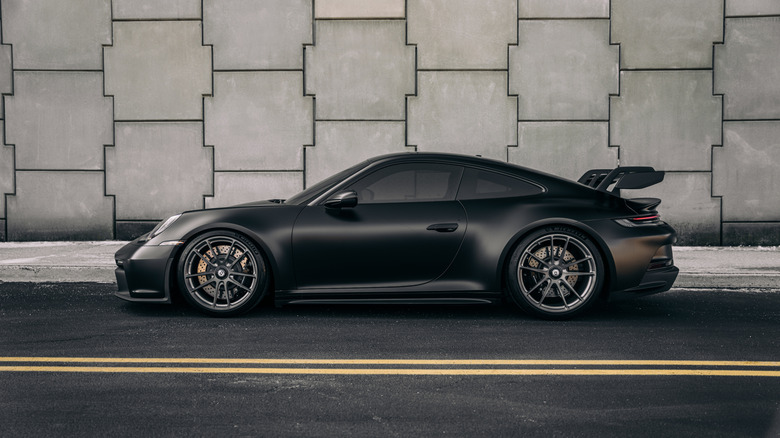This European Car Brand Just Took A Market Hit
Times can be tough during periods of economic uncertainty, especially for luxury car brands. Porsche, the German brand behind the 911, Macan, and Cayenne has long been known for making sports car and SUV luxury legends. However, the company has faced profit warnings and stock slips in 2025, in part due to a tangled web of sociopolitical and geopolitical concerns all over the globe. More specifically, Porsche stocks hit the skids on Monday, September 22 after a prolonged period of stock struggles. After Porsche leaders gave another profit warning to shareholders in late September 2025, European Porsche stocks dipped 8%. Volkswagen, one of the largest shareholders in Porsche, dipped 7.7%. Overall, European auto shares were down 2.6% on Monday on The Stoxx Europe Automobiles and Parts index.
This shares slip comes hot on the heels of Porsche's announcement that profits would be hurt by its delay of electric vehicles. Despite being an industry leader in creating all-electric vehicle slates, Porsche is now essentially pulling up its stakes in EV, and pushing all-EV vehicle classes further into the future. Instead of Porsche's originally intended full EV release, the company announced plans for new combustion engine vehicles and a total product realignment. Plus, the company's September 2025 news — and subsequent market hit — comes on the heels of new sky-high United States visa costs, courtesy of President Trump.
Factors affecting Porsche
Customer interest, or lack thereof, in luxury all-electric vehicles has had a strong hand in the company's changing projected profit margins. Lower demand for EV vehicles in Europe, specifically, has plagued Porsche. Despite the company going public in September 2022 – and touting a strong EV lineup at the time — Porsche's stock value has fallen by nearly half since the IPO. This diminished interest in EV led to the company's swift and pricey return to making hybrid and combustion engine vehicles. In fact, Porsche's 2025 product changes will cost the company 3.1 billion euros, or $3.6 billion, in 2025 alone. This investment shaves potential profit margins down considerably, and in turn, stock prices.
Tariffs are another major factor impacting all automakers. The constant stop-and-start nature of tariffs in 2025 has blanketed the auto industry with confusion and loss. Trump's tariffs have hit Stellantis hard, as well as stopped Mazda production in the United States. Trump's tariffs have also cost Volkswagen $1.5 billion already. Plus, the weight of these U.S. tariffs are combining with certain economic factors in China to further hobble Porsche specifically. While China was once a top market for the German automaker, the country's recent economic slowdown has decreased demand for luxury Porsche vehicles. Plus, China boasts strong EV competitors, another factor plaguing Porsche's doomed EV release. All combined, the luxury brand's outlook is less than stellar.

